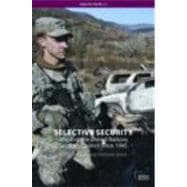
Note: Supplemental materials are not guaranteed with Rental or Used book purchases.
Purchase Benefits
What is included with this book?
| Glossary | p. 5 |
| Introduction | p. 7 |
| The Inherent Selectivity of the Council's Roles | p. 11 |
| Selectivity in the Charter | p. 12 |
| Not a collective security system | p. 17 |
| Selectivity and impartiality | p. 19 |
| The Council as an instrument of powerful states | p. 20 |
| The pursuit of international order outside the UN framework | p. 23 |
| Selectivity, the Council and nuclear proliferation | p. 24 |
| The selectivity of states regarding the Security Council | p. 27 |
| Underlying reasons for the Council's selectivity | p. 28 |
| Wars and Crises since 1945: The Overall Record | p. 31 |
| Causes of the decline of international war | p. 33 |
| The problem of civil war and other forms of conflict | p. 35 |
| The scope of Council action and inaction | p. 37 |
| Unintended effects of ceasefire demands, peace agreements and peacekeeping operations | p. 39 |
| Three main categories of Council-mandated and endorsed operations | p. 41 |
| Proposals for UN Standing Forces: A Record of Failure | p. 47 |
| The Charter basis | p. 47 |
| Proposals from Trygve Lie onwards | p. 49 |
| The art of the possible | p. 50 |
| Innovation and Flexibility since the End of the Cold War | p. 53 |
| Expansion of Peacekeeping | p. 54 |
| International administration of post-conflict territories | p. 55 |
| Expansion of the category of threats to international peace and security | p. 56 |
| Seeking application of the law of armed conflict | p. 57 |
| Innovation and selectivity: two sides of a coin | p. 58 |
| Accountability and Reform | p. 59 |
| Security Council accountability | p. 59 |
| Formal change: proposals for structural reform of the Security Council | p. 61 |
| Informal change: reforms to working methods | p. 64 |
| Proposals for an international organisation of democracies | p. 65 |
| Conclusion: Problems and Opportunities of Selective Security Today | p. 67 |
| Weaknesses in the Council's record | p. 68 |
| Strengths in the Council's record | p. 72 |
| Selective security: implications for UN member states | p. 74 |
| UN Security Council-Authorised Military Operations, 1950-2007 | p. 79 |
| Notes | p. 85 |
| Table of Contents provided by Ingram. All Rights Reserved. |
The New copy of this book will include any supplemental materials advertised. Please check the title of the book to determine if it should include any access cards, study guides, lab manuals, CDs, etc.
The Used, Rental and eBook copies of this book are not guaranteed to include any supplemental materials. Typically, only the book itself is included. This is true even if the title states it includes any access cards, study guides, lab manuals, CDs, etc.